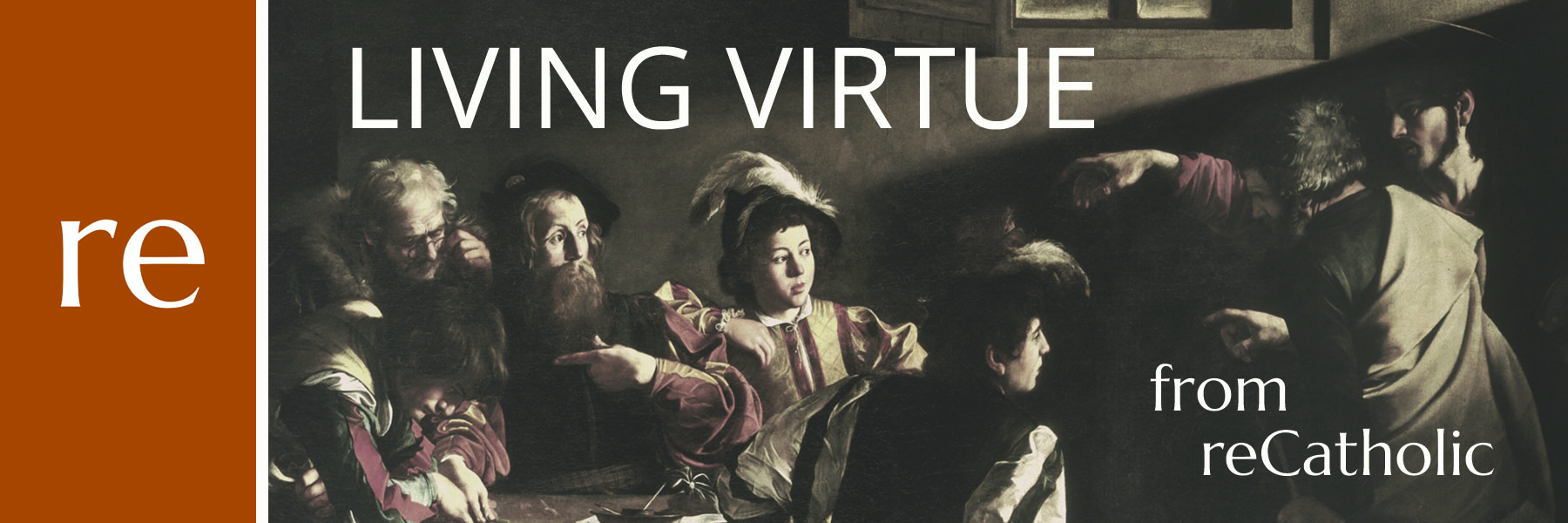
Virtue – Justice
Justice is the habit of treating everyone fairly. This includes making sure that we carry out our responsibilities faithfully and that we respect the rights of others.
1. Understand Justice
What is Justice?
Rights and duties always go hand in hand. For example, I have the right to live; but therefore also have the responsibility to respect the lives of others.
Justice has to do with our relationship with other people and everything that they own.
We are required to live justly on different levels, starting with treating our family and the individuals fairly, who we interact with on a regular basis. But justice also extends as far as the rights and responsibilities that we have towards our larger communities in society — schools, cities, countries — even beyond borders.
From the Catechism
1807 Justice is the moral virtue that consists in the constant and firm will to give their due to God and neighbor. Justice toward God is called the “virtue of religion.” Justice toward men disposes one to respect the rights of each and to establish in human relationships the harmony that promotes equity with regard to persons and to the common good. the just man, often mentioned in the Sacred Scriptures, is distinguished by habitual right thinking and the uprightness of his conduct toward his neighbor. “You shall not be partial to the poor or defer to the great, but in righteousness shall you judge your neighbor.”68 “Masters, treat your slaves justly and fairly, knowing that you also have a Master in heaven.”69
The Virtue Lived – St. Katharine Drexel
 “You should be that missionary” – Pope Leo XIII
“You should be that missionary” – Pope Leo XIII
St. Katherine Drexel was born into a wealthy Pennsylvanian family in 1858. Her father taught her the importance of loving her neighbor even when it was uncomfortable, often opening their home to share basic necessities with the poor.
After her parents died, St. Katherine ventured out west and witnessed the needs of the Natives and the African American people. She found disparities, racism, and hatred and made it her passion to donate much of her inherited fortune to their cause. She later met with Pope Leo XIII, asking him for missionaries to aid in her fight for justice. The Holy Father challenged her to be that missionary — and so she both funded and founded a religious order called the Sisters of the Blessed Sacrament for Indians and Colored in 1913.
St. Katherine believed in justice and education for all. During her lifetime she founded Xavier University as well as 40 mission centers and 23 black rural schools spanning 13 states. She faced her opposition head-on and didn’t back down from segregationists who fought her and burned down her work.
She trusted the Lord, loved all of her brothers and sisters in Christ, and fought for the educational equality of all. During a time of deep political and racial unrest, St. Katherine lived the words of the Gospel: “You shall love the Lord your God with all your heart, with all your soul, with all your mind, and with all your strength’ The second is this: ‘You shall love your neighbor as yourself” (Mk 12:30-31).
2. Virtue In My Life
Spiritual Questionnaire
Questions geared towards self knowledge and personal growth
Struggles
- Am I careless when using or borrowing other people’s things: tools, toys, supplies, etc.? Do I ever take things that are not my own?
- Are there times that I forget about my chores or neglect my duties towards my family? Do I ever avoid them on purpose?
- Do I respect the laws that protect the safety, health and well-being of our society: examples are things like traffic laws, park rules, proper disposal of waste, handicapped guidelines, respect for public property, etc.?
- Do I ever fail to keep my promises when making deals with friends? Am I faithful to paying back my debts?
Highlights
- Can I think of some rules that I follow out of good habit – maybe in school, at work, or at home? Why are these habits good? Do I notice how it’s easier to do something once it becomes habitual?
- Have I ever reflected on the fact that it is natural for everyone to want things to be fair? Do I realize that this rule is God’s gift to all humanity to help us live well?
- Do I often listen to my conscience, which reminds me of what is right and wrong, when deciding whether or not to do something?
- Do I support the poor and the struggling of this world? Do I regularly volunteer my time or give financially to support my Church, or other charitable organizations that do good for those who are less fortunate than I am?
- Am I habitually grateful to those who take care of me in society: Family, teachers, coworkers, friends, teammates, etc.? Do I often tell them thank you for the good things that they do?
Prayer
- Do I often thank God for being just, but also for granting me forgiveness and thereby giving me the chance to start over?
- When I prepare for confession, do I also review my list of responsibilities: as regards my family, my place of work or school, my friends, any groups or organizations I may be a part of, etc.?
3. Growing In Virtue
A Prayer for Virtue
God, You give us the responsibility to care for the people around us. Help me to serve and care for their genuine good. Help me always keep Your words in my heart, “What you did to the least of these, you did for me.” Amen.
St. Katharine Drexel // Pray for us!
Practical Tips for Living This Virtue
- When tempted to treat others unfairly, it’s helpful to place yourself in their shoes, and to ask how you would like to be treated in the same situation.
- The best remedy for injustice is often a greater long for heaven; we know that when Jesus returns all wrongs will be made right and all secrets will be laid bare. An eternal reward is so much more valuable than any earthly possession or power or recognition. This reflection works well both when we’ve been wronged and when we are tempted to treat others unjustly.
- At the heart of injustice is often an undue attachment to material goods or possessions. If you find yourself struggling in your relationship with other people because of material things that you want, then serving the poor and getting to know their real needs will help you put everything into perspective.
4. Other Resources
The Catechism
1836 Justice consists in the firm and constant will to give God and neighbor their due.
2407 In economic matters, respect for human dignity requires the practice of the virtue of temperance, so as to moderate attachment to this world’s goods; the practice of the virtue of justice, to preserve our neighbor’s rights and render him what is his due; and the practice of solidarity, in accordance with the golden rule and in keeping with the generosity of the Lord, who “though he was rich, yet for your sake . . . became poor so that by his poverty, you might become rich.”189
2411 Contracts are subject to commutative justice which regulates exchanges between persons in accordance with a strict respect for their rights. Commutative justice obliges strictly; it requires safeguarding property rights, paying debts, and fulfilling obligations freely contracted. Without commutative justice, no other form of justice is possible.One distinguishes commutative justice from legal justice which concerns what the citizen owes in fairness to the community, and from distributive justice which regulates what the community owes its citizens in proportion to their contributions and needs.
2412 In virtue of commutative justice, reparation for injustice committed requires the restitution of stolen goods to their owner:
Jesus blesses Zacchaeus for his pledge: “If I have defrauded anyone of anything, I restore it fourfold.”192 […]
2446 St. John Chrysostom vigorously recalls this: “Not to enable the poor to share in our goods is to steal from them and deprive them of life. the goods we possess are not ours, but theirs.”238 “The demands of justice must be satisfied first of all; that which is already due in justice is not to be offered as a gift of charity”:239
When we attend to the needs of those in want, we give them what is theirs, not ours. More than performing works of mercy, we are paying a debt of justice.240
1943 Society ensures social justice by providing the conditions that allow associations and individuals to obtain their due.
1944 Respect for the human person considers the other “another self.” It presupposes respect for the fundamental rights that flow from the dignity intrinsic of the person.
Quotes From Saints
The rule of justice is plain: namely, that a good man ought not to swerve from the truth, nor inflict any unjust loss on anyone, nor act in any way deceitfully or fraudulently. – Ambrose of Milan
Two main reasons why men fall short of justice: deference to magnates, and deference to the mob. – Thomas Aquinas
Act like a seller when you’re buying, and a buyer when you’re selling, and then you’ll sell and buy justly. – Francis de Sales
A society of men is just only if it obeys You. – Augustine of Hippo
To the poor in spirit the kingdom of heaven is assigned as a present recompense, for theirs is the kingdom of heaven. This is so because to those who are truly poor in spirit, the Lord gives great helps, even in this life. – Alphonsus Liguori
Heaven is at present out of sight, but in due time, as snow melts and discovers what it lay upon, so will this visible creation fade away before those greater splendors which are behind it. – John Henry Cardinal Newman
The country in which I live is not my native country; that lies elsewhere, and it must always be the center of my longings. – Thérèse of Lisieux
Books
Interior Freedom – Jacques Philippe
Videos
Justice in the Bible – The Bible Project
Justice According to Aquinas – Fr. Aquinas Guilbeau, O.P.
Videos en Español
Virtud de la justicia – Virtudes Humanas
Footnotes
68 Lev 19:15.
69 Col 4:1.
189 2 Cor 8:9.
192 Lk 19:8.
238 St. John Chrysostom, Hom. in Lazaro 2, 5: PG 48, 992.
239 AA 8 # 5.
240 St. Gregory the Great, Regula Pastoralis. 3, 21: PL 77, 87.